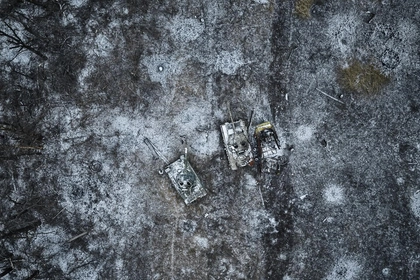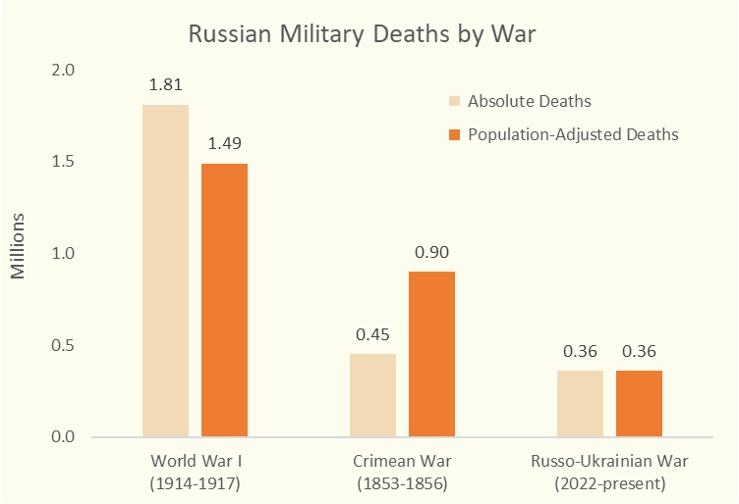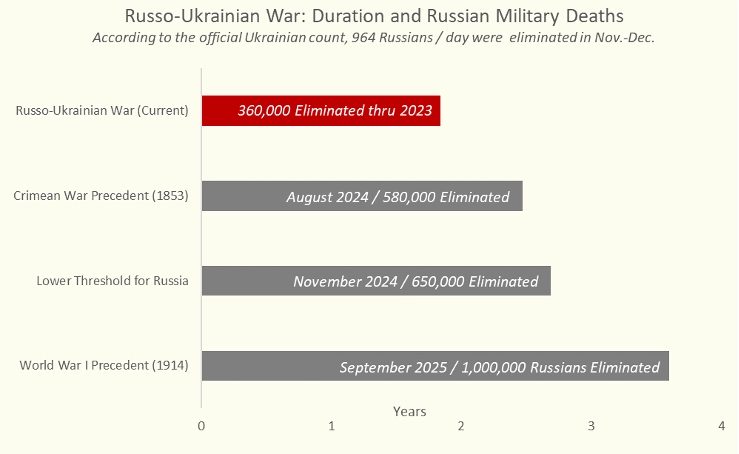With the close of the year, it is once again time to reconsider the prospects for the end of the war. The major change, compared to our earlier analysis, is the elevated pace of Russian casualties. During November and December, the Russians lost just shy of 1,000 men per day, according to the official Ukrainian count. This is a spectacular pace of loss and, if continued, could shorten the war by as much as a year.
The length of wars is determined by a number of factors. These include the belligerents' economic and military capabilities, as well as their ability to maintain political cohesion. Military deaths are a key factor in the public's willingness to sustain a conflict. Prior wars can therefore provide some insight into the limits of, in this case, Russian perseverance.
JOIN US ON TELEGRAM
Follow our coverage of the war on the @Kyivpost_official.
The current Russo-Ukrainian war already qualifies as the fourth deadliest external conflict in Russian history. The third is the Crimean War (1853-1856), which lasted 900 days and cost the Russians 450,000 dead in a losing effort. At the recent pace of Russian losses, the current conflict will move into third place before Easter.
It is worth noting, however, that the population of the 1850s Russian Empire was approximately half of its current level. Therefore, adjusted for population, Russian eliminations would need to rise to 900,000 for the current conflict to qualify as third worst of all time and, by historical precedent, induce Russian capitulation.

Ukraine Strikes Russian Aircraft Factory, Oil Depot Hit Again, Says Kyiv
At the lower limit, Moscow might plausibly face meaningful public resistance around 650,000 Russian military deaths, about twice the current number and half again as much as from the Crimean War of 1853.
This view is based on three factors. First, deaths are simply more visible today, even with the various censorship programs employed by the Russian government. Second, Russia is for all that a marginally more civilized country than it was in the 1800s, and the public's tolerance may be accordingly less. Third, and most importantly, this war is entirely discretionary for Russia.
Unlike World War I, which saw massive losses of Russian territory, including Finland, Poland, the Baltics and Bessarabia (largely today's Moldova), Russia is facing no territorial losses compared to the pre-war era. Further, no fighting is occurring on Russian soil, and no one has attacked Russia. The war poses no existential threat to Russia as did, for example, the German invasion during World War II. St. Petersburg is not under siege, no one has sacked Moscow, and there is no house-to-house, to-the-death fighting in Stalingrad (Volgograd today). Thus, the Kremlin must justify 650,000 deaths for what was supposed to be a mere three-day, special military operation entirely of Putin's choosing.
Russia's Achilles heel is exactly the low stakes of the conflict. Putin could order the troops home tomorrow, and Russia would be no worse off than in 2014, a time when Russia was actually seeing something of a renaissance.
At the current pace, Russian losses will reach 650,000 dead by late 2024. If this proves to represent a threshold of public tolerance, the war could end at that time. The next stop is one million Russian dead, which could be expected by autumn 2025 at the current rate of eliminations.
If the war extends so far, it will have lasted as long as World War I for Russia, and the media will routinely compare the conflict to the Great War, which saw 1.8 million Russian military killed (1.5 million adjusted for Russia's current population). Although Putin claims Russia will fight for five years, the Russian public found the losses of World War I intolerable and overthrew their government. If Russia continues to lose 1,000 soldiers every day, Russia will likely concede the war before the end of 2025.
For Americans, there are some important takeaways.
First, this is a major war. It will rank third in all of Russia's bloody history by the time the tulips bloom this spring. This is not some minor conflict in a faraway country, but a major European conflict requiring substantial determination and commitment.
Second, this is not a forever war. It will be resolved in some fashion within two years if hostilities remain at their current pitch.
Finally, independence is worth a very large number of Ukrainian lives. The outcome of this war will likely determine the fate of Ukraine and Europe for the next century, just as the defeat of the Ukrainian struggle for independence in 1917 determined Ukraine's narrative until the fall of the Soviet Union in 1991. The Bolshevik defeat of Ukraine's republic set the stage for the Holodomor, which claimed up to 5 million Ukrainian lives, and presaged the Soviet domination of Eastern Europe for a half century.
The Ukrainians need to decide what independence is worth. If I compare it to Hungary, from which my family fled in the closing days of World War II, we would have gladly fought and thought losses of two percent of the population worth it if Hungary could have retained its independence in 1945 or regained it in 1956. That equates to nearly one million Ukrainians, and at the current rate of exchange, 3-5 million Russians.
If it is worth the price to Ukrainians, the Russians will lose, as long as Ukraine's allies stand beside it.
Steven Kopits heads Princeton Policy Advisors. A strategic management consultant and investment banker, he writes frequently on policy topics for a variety of publications, including Foreign Policy and The National Interest, and is a regular contributor to CNBC and The Hill.
This article is reprinted from Princeton Policy Blog. See the original here.
The views expressed in this opinion article are the author’s and not necessarily those of Kyiv Post.
You can also highlight the text and press Ctrl + Enter












